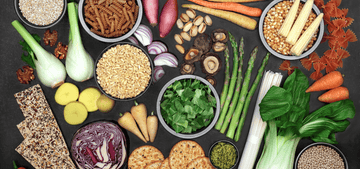What will you eat today, tomorrow, and next week? If you’re a new Vegan, it might be a difficult question to answer. You need food that is nutritional and beneficial, while also being vegan-friendly and affordable.
It’s best to do your plant-based meal planning in advance, ensuring you have plenty of food to eat in the house and that you know what’s good and what’s not. In this guide, we’ll take a look at example shopping lists, meal planning tools, and some healthy vegan meal prep ideas.
Key Takeaways:
- Vegan Shopping List Essentials: Explore a variety of vegan-friendly foods to enjoy and incorporate into your diet, focusing on meat and dairy alternatives, snacks, dried goods, and fresh produce.
- High-Quality Vegan Protein Sources: Uncover the wealth of plant-based protein options, such as tempeh, seitan, and chickpeas, essential for muscle growth and repair.
- Supplements for Balanced Nutrition: Learn about vital supplements, including Ahiflower for Omega-3 and vegan D3, to ensure a well-rounded vegan diet.
- Creative Vegan Meal Prep Ideas: Simplify your diet with practical meal prep tips, ensuring you have healthy, plant-based options ready to go.
Vegan Shopping List Tips
Buy what you like and eat what you enjoy—that’s the first priority of any type of meal plan. Sure, some foods are best ignored and others can provide a great addition to your diet, but food is more than just fuel. It needs to be enjoyed, and if you start forcing yourself to eat things you don’t like, there’s less chance you’ll stick to your regime.
Keep this in mind as you browse through the tips below, as these are just some of the things found in a typical balanced vegan diet:
Meat and dairy alternatives
Alternatives/substitutes are handy if you’ve recently transitioned to a plant-based diet. They are also useful if you do a lot of cooking/baking and regularly find yourself looking for egg, meat, or dairy substitutes:
- Aquafaba, chia seeds, or vegan egg substitute
- Tofu or soy-based meat substitutes
- Vegan cheese
- Non-dairy milk
It’s best not to become too reliant on meat and milk alternatives. There are certainly a lot of tasty options on the market and they are great as an occasional treat, but many of them are heavily processed and contain a lot of salt and/or sugar.
Vegan snacks
There’s nothing wrong with a little snacking. These foods are a great way to soothe hunger pains and keep energy levels high:
- Dark chocolate
- Dried peas/beans
- Popcorn
- Dried fruit
- Roasted chickpeas
- Roasted nuts
- Hummus
Dried goods
Dried foods are staples that you keep on hand, whether in the pantry or stacked in a cupboard. They can be used to create daily meals and snacks and they typically have a long shelf-life:
- Rice
- Pasta
- Quinoa
- Dried seaweed
- Popcorn
- Lentils
- Beans
Fresh fruit and vegetables
This is all about personal preference. There are far too many fruits and vegetables to list, and most are good for you. Some of the most nutrient-dense plant-based foods (in terms of fiber, protein, and nutrient content) include:
- Sweet potatoes
- Kale
- Broccoli
- Brussel sprouts
- Cabbage
- Raspberries
- Blackberries
- Kiwi
- Apples
Quality protein sources
Protein is essential for muscle growth and repair, and there is an abundance of high-quality vegan protein sources:
- Tempeh
- Seitan
- Black beans
- Chickpeas
- Green peas
- Nutritional yeast
Herbs and spices
Not only are herbs and spices a great way to add flavor to your food but they are also loaded with an assortment of vitamins and minerals. Use them liberally:
- Turmeric
- Black pepper
- Ginger
- Cinnamon
- Cumin
- Chili powder
- Cayenne pepper
- Rosemary
- Oregano
- Thyme
- Cilantro
Supplements
You can get most of the nutrients you need from food, but it doesn’t hurt to top up. This is especially important if your diet isn’t as balanced, clean, and comprehensive as it should be:
- Ahiflower (for Omega-3)
- Organic Vegan D3
- Vitamin B12
- Iodine
Vegan Meal Prep Ideas
Convenience is one of the biggest diet killers. You’re tired, busy, and short on time—it’s much easier to grab fast food or a candy bar than it is to cook something healthy. So, make life easier for yourself by cooking and freezing meals in advance. That way, you can just reheat when ready and you’re good to go!
Focus on a variety of plant-based macro and micronutrients. If you’re not sure what contains what, just start with a carb base (such as rice, pasta, oats, or quinoa), add a protein source (beans, tofu, lentils), and then throw a couple of servings of vegetables into the mix.
Plant-based fitness meal ideas
Start with a few basic recipes, some excellent combinations, and then build from there. Some of the best plant-based food combinations include:
- Salads and seeds (including pomegranate seeds)
- Bell peppers and beans
- Oatmeal and dried fruit
- Garlic and pasta
- Carrots/celery and hummus
- Rice and beans
If you struggle with salads, spend some time finding a good dressing. It can bring a salad to life and create the perfect side dish for every main meal. Mustard, vinegar, oil, lemon, garlic, and tahini are all great dressing ingredients. If you like ranch, try making a vegan version using vegan mayo, apple cider vinegar, dairy-free milk, garlic, parsley, onion powder, pepper, and dill.
You should have a go-tip dip (or two) as well. Hummus is always a good option, but muhammara (a Lebanese dip consisting of roasted peppers, ground walnuts, and pomegranate molasses) and baba ghanoush (made from roasted eggplants) are fantastic options.
Vegan Nutrition Guidelines
Nutrition guidelines for Vegans are much the same as guidelines for everyone else. They include the following:
- 2,500 calories per day for men; 2,000 for women
- Limit added sugars to less than 10% of total daily calories
- Limit saturated fat to less than 10% of total daily calories
- No more than 2,300mg of sodium per day
- At least 5 servings of fruit and veg per day
If you eat a balanced diet and meet your calorie requirements, you shouldn’t have an issue with nutrient deficiencies. However, Vegans occasionally suffer from issues with the following:
- Omega-3 fatty acids: Vegans can get their fix of these healthy compounds from seed oils. Ahiflower oil is one of the best sources of both essential Omega-3 and Omega-6. These essential fats are also found in flaxseed and chia seeds, though Ahiflower was shown to increase EPA 4 times more than flax and increase DHA more than flax as well. Ahiflower also provides Omega 3 SDA and beneficial GLA not found in flax or chia.
- Vitamin B12: Many Vegans take B12 supplements, but these days there are plenty of natural options. Many non-dairy milks are fortified with B12, as are cereals. You can find it in nutritional yeast too, which is also a good source of protein. Bioavailable B-12 is also found in Lemna (aka Duckweed), a flowering freshwater plant, in significant enough amounts to meet human requirements. (1)
- Vitamin D3: Supplementation is the best way to ensure you get adequate amounts of vitamin D. Buy your organic vitamin D here.
Optimal Vegan Meal Timing
It doesn’t really matter when you eat, as long as you meet your macronutrient and micronutrient needs throughout the day. If you struggle to eat first thing in the morning, save your first meal for later in the day; if you don’t have a lot of time throughout the day, eat a big meal when you can or prepare lots of smaller meals. You should also listen to your body, for instance, if…
- You can’t sleep at night, leave your big meals for earlier in the day
- Your energy levels dip mid-day, eat a bigger breakfast or snack around mid-day
- You find that you get ravenously hungry during the evening, prepare your biggest meal around the same time
It’s all a matter of preference. There are a lot of theories out there regarding intermittent fasting and big meals vs small meals, but clinical research is scant. Just make sure you’re sufficiently fueled for your workouts and don’t worry about the so-called “anabolic window” (the need to eat protein shortly after a workout) as it doesn’t exist.
Summary: Vegan Meal Prepping
Before you go off and start your meal prepping, there are a few vegan meal-planning tools and apps that can help you. These tools make it easier to track what you’re eating—and what kind of nutrients those foods contain—and find delicious recipes:
- Cronometer and MyFitnessPal: For tracking meals and macros.
- Food Monster: Lots of plant-based recipes.
- Happy Cow: Helps you to locate vegan restaurants in your area
- Dr. Greger’s Daily Dozen: A health-focused vegan app with advice on the best nutrient-dense plant-based foods.
For more advice on vegan meal prep, including macro optimization, check out this guide to vegan meal planning.
References
Study: Wolffia globosa–Mankai Plant-Based Protein Contains Bioactive Vitamin B12 and Is Well Absorbed in Humans
- Conclusion: …contains bioactive B12 compounds and could serve as a B12 plant-based food source.
- Link: MDPI: Wolffia globosa–Mankai Plant-Based Protein Contains Bioactive Vitamin B12 and Is Well Absorbed in Humans




